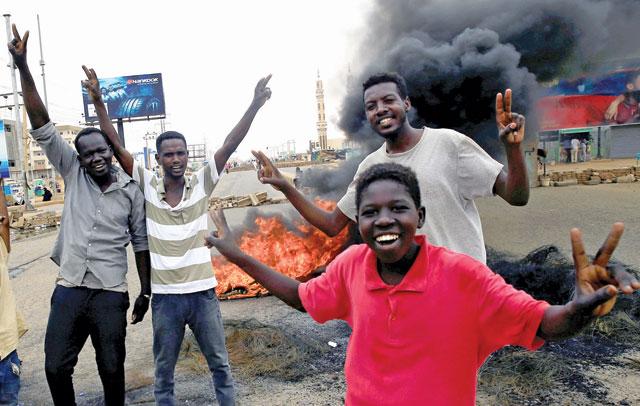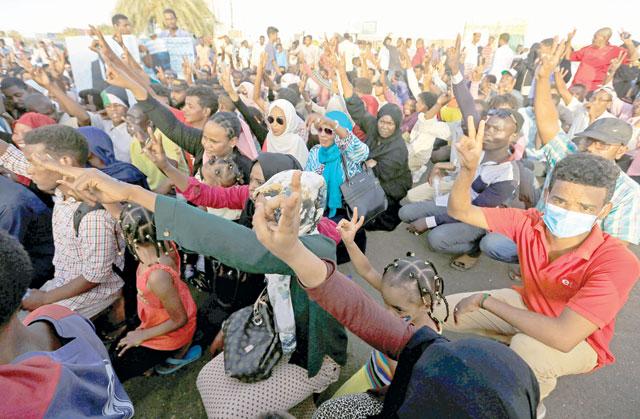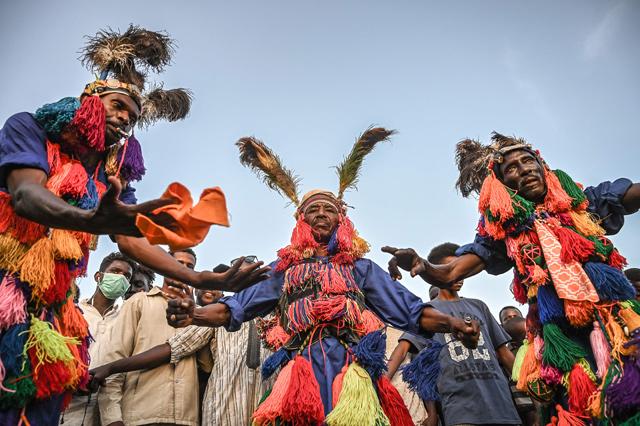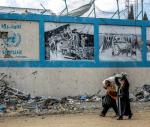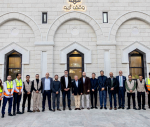You are here
Sudan military council, opposition inch closer to final deal
By Reuters - May 15,2019 - Last updated at May 15,2019
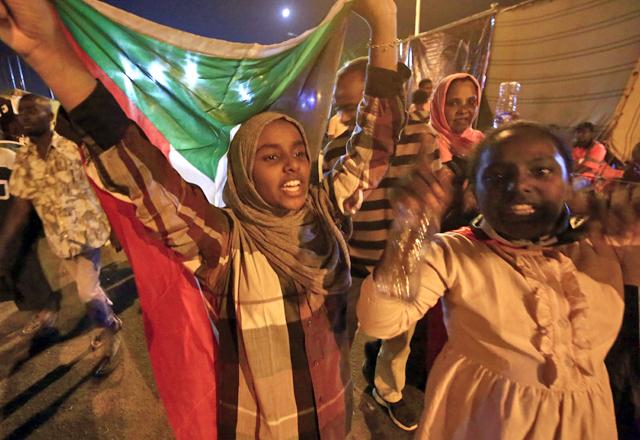
Sudanese protesters celebrate after an agreement was reached with the military council to form a three-year transition period for transferring power to a full civilian administration, in Khartoum, early on Wednesday (AFP photo)
KHARTOUM — Sudan’s Transitional Military Council (TMC) and the opposition Declaration of Freedom and Change Forces (DFCF) agreed the country’s transition period would last for three years, a TMC member said on Wednesday, adding a final deal on the transition would be reached within 24 hours.
Lt. Gen. Yasser Al Atta also said DFCF will have two-thirds of the seats on a transitional legislative council and parties that are not part of the alliance will take the rest.
Satea Al Hajj, a DFCF member, said: “the viewpoints are close and, God willing, we will reach an agreement soon” on the composition of a new sovereign council that would lead the country until elections.
The TMC had said the transition would last a maximum of two years, and the DFCF wanted it to last four years.
Sudan’s opposition alliance had blamed the military rulers on Tuesday for renewed street violence complicating efforts to negotiate a handover of power to civilians after last month’s overthrow of President Omar Al Bashir.
But Madani Abbas Madani, another DFCF figure, said on Wednesday that it was “abundantly clear that there are counterrevolutionary forces who are naturally displeased with any progress in negotiations”.
At least four people died and dozens were injured during protests on Monday as the TMC and opposition DFCF said they had reached a partial agreement for transition.
Madani, speaking to a news conference alongside Atta past midnight, said the TMC had formed a committee to investigate the targeting of protesters. He also said a joint committee was set up with DFCF to thwart any attempt to break up a sit-in at the defence ministry.
Gunfire rang out in the capital into the night on Monday after paramilitary Rapid Support Forces — whose head is deputy of the military council — had patrolled the streets using tear gas and guns to disrupt demonstrations.
The protesters, who want to keep pressure on the military for a swift handover, were back on Tuesday, blocking roads and bridges with bricks and rocks, images on social media showed.
Demonstrators have been camped at a sit-in outside the defence ministry since April 6. On Tuesday, the sit-in area and eastern Khartoum were blocked off from the capital’s centre by barriers that the protesters have erected.
“The bullets that were fired yesterday were Rapid Support Forces bullets and we hold the military council responsible for what happened yesterday,” Khalid Omar Youssef, a senior figure in the DFCF, told a news conference on Tuesday.
“While they claimed that a third party was the one who did so, eyewitnesses confirmed that the party was in armed forces vehicles and in armed forces uniforms, so the military council must reveal this party.”
‘He meant to kill me’
Monday’s fatalities were the first in protests for several weeks after months of demonstrations led to Bashir’s fall.
The victims included a military police officer and three demonstrators, state TV said.
The TMC, which took over after ousting the long-ruling Bashir last month, blamed the violence on saboteurs unhappy with the transition accord.
The United States backed the opposition alliance in pinning the blame for Monday’s chaos on the military for trying to remove roadblocks set up by protesters.
“The decision by security forces to escalate the use of force, including the unnecessary use of tear gas, led directly to the unacceptable violence later in the day that the TMC was unable to control,” said the US embassy in Khartoum.
One hospital in Khartoum said it received more than 60 wounded on Monday as well as three dead bodies.
Some arrived with gunshot wounds in the shoulder, chest and other body parts, Amar Abu Bakr, executive director of the Moalem Medical City Hospital, told Reuters.
“There are also a number of wounds resulting from sharp objects and others from beatings by sticks.”
Raed Mubarak, a protester who was wounded, said a shooter was about 20 metres away when he took aim. “He shot at my chest... he meant to kill me, not to scare or terrorise,” he said.
Related Articles
KHARTOUM — Sudan's opposition on Tuesday rejected a plan by its military rulers to hold elections within nine months, a day after the worst
KHARTOUM — Sudan's military rulers and an opposition alliance met on Monday to discuss the powers of a joint military-civilian council to st
KHARTOUM — Sudan's ruling Transitional Military Council (TMC) and opposition forces appeared on a collision course on Monday amid deepening


